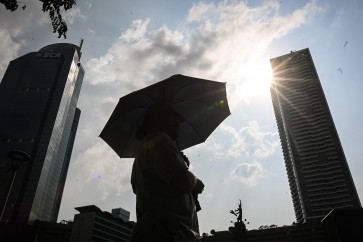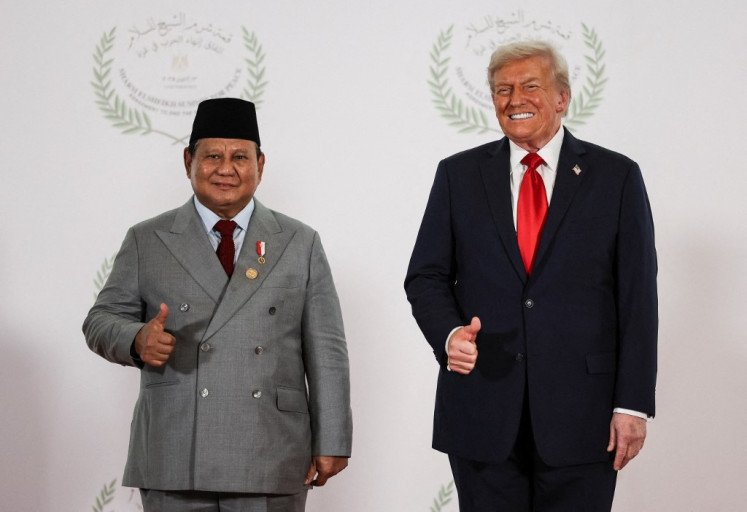Popular Reads
Top Results
Can't find what you're looking for?
View all search resultsPopular Reads
Top Results
Can't find what you're looking for?
View all search resultsWhen society deprives sexual minority groups of their rights
Modern Indonesia has inherited the values and representations of traditional Asia in the form of rules, in particular customary rules, habits and manners, which govern its citizenâs everyday lives
Change text size
Gift Premium Articles
to Anyone
M
odern Indonesia has inherited the values and representations of traditional Asia in the form of rules, in particular customary rules, habits and manners, which govern its citizen's everyday lives. Because of this, many Indonesians consider sexual minority groups, such as homosexuals, moral and religious deviants.
Indonesia was reborn in 1998 thanks to reforms that allowed the country to structurally and systematically kick start democracy. The mutual symbiosis between state and society is supposed to be a fetus to developing a good government.
Despite the blossoming democracy, women and homosexuals have continuously been discriminated against, stigmatized and even criminalized.
In western society, the Victorian era in the 19th century marked the beginning of the social alienation of homosexuality. In this era, sexual relations and marriage were only between a woman and man to procreate, not to recreate. Same-sex relationships were strictly prohibited, while history shows that in European civilizations, Julius Cesar indirectly adopted the system of pederasty by having many handsome male mistresses.
Meanwhile, Indonesian history notes that homosexuality has been in place for hundreds of years as evident in the presence of Bissu monks in Bugis, South Sulawesi, the tradition of warok-gemblakan in Ponorogo in East Java, Ludruk theater performances in East Java, the Indang dance in West Sumatra and the Rateb Sadati dance in Aceh, to name a few.
Discrimination against homosexuals comes as no surprise as French philosopher Michel Foucault once said that the discourse of sexuality was a question of power through regulations made by the government.
In Indonesia, the state produced and reproduced ideas of 'the perfect sexuality' to society to prevent threats to the Indonesian family structure. Homosexuality, thus, is regarded as a common enemy and, automatically, a common threat. Confessions of homosexuality will sooner or later result in alienation by other family members, relatives, friends or even colleagues.
Such consequences have prevented many Indonesian homosexuals from coming out. They assume that as long as they hide their sexual orientation, the state and society will not desert them. As a 'systematic danger', homosexuals are prone to violence and harassment.
In general, long-standing misunderstandings about this sexual minority group stems from a lack of commitment from the state to human rights. What we can find by discussing the concept of human rights in Indonesia is the silence of the concept itself and opposition from conservative religious groups who cannot accept the common definition of human rights.
Historically, discourse on human rights in Indonesia began when its founding fathers held talks to prepare for an independent state in 1945. Unfortunately, after 1965, this idea started to vanish and was only talked about among university students, human rights activists and to a certain extent, the media. Human rights, thus, endured a long period of silence.
After Reformasi (Reform) in 1998, the People's Consultative Assembly (MPR) issued a decree related to the state recognition of human rights, as follows: (1) Basic rights for all human beings without differences. Human rights are a grace from God. (2) Each human being has equal rights regardless of differences in sex, skin color, nationality, religion, age, political views, social status and language and other status (3) Indonesia realizes that human rights is a dynamic concept.
The third and last point is a big mistake because it justifies conservative religious groups who have their own concept of human rights, which will potentially annihilate the rights of other people they consider to be 'sinners'.
The stigma against the LGBT (lesbian, gay, bisexual and transgender) community could be removed if the state, religious leaders and society shared a common good and held dialogue with the sexual minority groups. As Rosalind Morris put it, the power and the strength of countries are totally different, and of course, how they handle sex and gender issues are different too, according to the context.
The writer is completing his PhD program in sociology at Ecole des Hautes Etudes en Sciences Sociales (Ehess), Marseille, France. His thesis concerns the Indonesian gay community in France.










